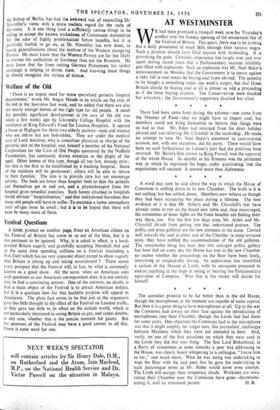AT WESTMINSTER
WE had been promised a tranquil week save for Thursday's conflict over the Sunday opening of the amusement fair of the Festival of Britain. This apart, there was to be nothing but a daily procession of small Bills through their various stages. Such a promise should have filled anyone with foreboding. It is provoking the gods. Certainly, experience has taught over and over again during recent years that a Parliamentary vacuum infallibly gets filled with explosions. Such an explosion was Mr. Noel Baker's announcement on Monday that the Government is to insure against a risky fall in coal stocks by buying coal from abroad. The quantity to be bought is something under one week's output, but that Great Britain should be buying coal at all is almost as odd a proceeding as if she were buying cruisers. The Conservatives were shocked but articulate; the Government's supporters shocked but silent.
There had been some hints during the autumn—one came from the Minister of Food—that we might have to import coal, but members could not bring themselves to believe that things were so bad as that. Mr. Eden had returned from hi i short holiday abroad and was relieving Mr. Churchill in the leadership. He made no attempt to turn Mr. Noel Baker's statement to controversial account, nor, with one exception, did his party. There would have been no such forbearance on Labour's part had the positions been reversed. Mr. Bevin's firm answer to King Farouk won the approval of the whole House. As notable as his firmness was the persistent way in which he expressed the hope, under questioning, that the negotiations will succeed: It seemed more than diplomatic.
* *
A word may now be said about the way in which the House of Commons is settling down in its new Chamber. The truth is it is not settling, but has settled, down. Members now behave as though they had been occupying the place during a lifetime. The best evidence of it is that Mr. Attlee's and Mr. Churchill's feet have already come to rest on the brand new table and, thus encouraged, the extremities of lesser lights on the front benches are finding their way there, too. For the first few days even Mr. Attlee and Mr. Churchill shrank from getting into that unbuttoned posture. The public and press galleries are the new elements in the scene. Carried well towards the roof at either end of the Chamber in steep terraced seats, they have trebled the accommodation of the old galleries. The remarkable thing has been that this enlarged public gallery has been full on every day the House has met in the new Chamber no matter whether the proceedings on the floor have been lively, interesting or unspeakably boring. Its appearance has resembled a section of the Mound at Lords, with its occupants prepared to endure anything in the hope of seeing or hearing the Parliamentary equivalent of Compton. Who that is the reader will decide for himself.
The acoustics promise to be far better than in the old House, though the microphones at the moment are capable of some caprice. But then it is a great thing to have microphones at all. Up to the war the Commons had always set their face against the introduction of microphones into their Chamber, though the Lords had had them for some years. One objection the Commons had to the microphone was that it might amplify for vulgar ears, like journalists', exchanges between Ministers which they were not intended to hear. And, verily, on one of the first occasions on which they were used in the Lords they did this very thing. The first Lord Birkenhead, in a flurry of resentment at some remarks a peer was addressing to the House, was clearly heard whispering to a colleague, "Leave him to me ;" and much more. What he was doing was undertaking to wipe the floor with the said peer, but he gave the undertaking in such picturesque terms as Mr. Attlee would never even attempt. The Lords still occupy their temporary abode. Workmen are reno- vating their Chamber now the Commons have gone—decontami-














































































 Previous page
Previous page